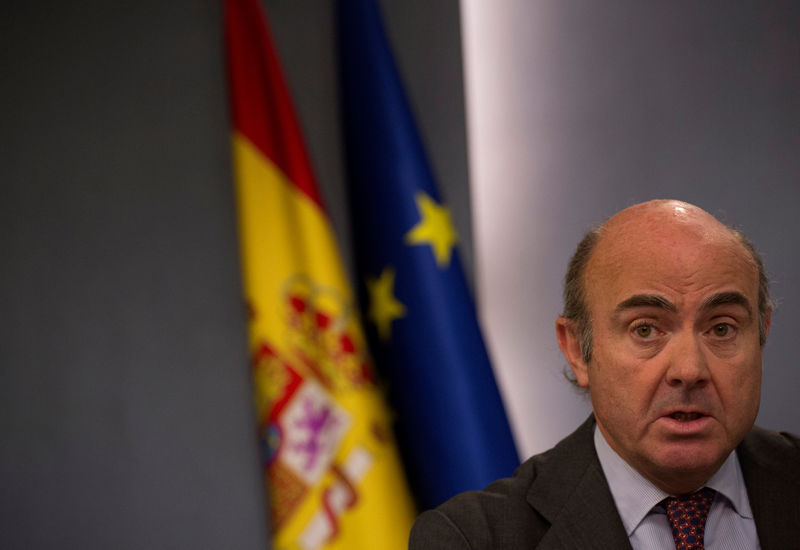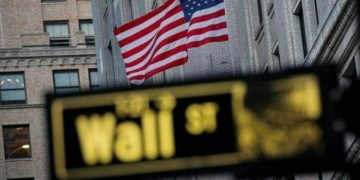 © Reuters. FILE PHOTO:Spain’s Economy Minister de Guindos speaks during a news conference after the weekly cabinet meeting at Moncloa Palace in Madrid
© Reuters. FILE PHOTO:Spain’s Economy Minister de Guindos speaks during a news conference after the weekly cabinet meeting at Moncloa Palace in MadridBy Jesús Aguado
MADRID (Reuters) – Widely credited with steering Spain through its worst recession in decades, its outgoing Economy Minister Luis de Guindos will hope to bring pragmatism and tenacity to the European Central Bank when he takes over as vice president in June.
Some EU lawmakers opposed his appointment, ratified on Monday by euro zone finance ministers, fearing the nomination of a politician could affect the bank’s independence.
But de Guindos’ track record in government and the financial sector suggest he has some justification in dismissing such concerns.
He showed calm under political fire by pushing through tight budgets and unpopular labor reforms during the economic downturn that shook Spain following the global financial crisis.
That experience helped foster a close relationship with former German finance minister Wolfgang Schaeuble.
Like Schaeuble’s compatriots on the ECB’s governing council, de Guindos is seen likely to favor an early normalization of ECB policy, as the debate among ratesetters shifts towards when and how fast it should unwind its ultra-loose monetary stance.
Though lacking a background in central banking, the 58-year-old can point to wide experience in the finance industry, as head of financial services in PricewaterhouseCoopers in Madrid and of Nomura Securities and Lehman Brothers in the Iberian peninsula before that.
De Guindos has been Spain’s economy minister since the conservative People’s Party (PP), headed by Prime Minister Mariano Rajoy, won the 2011 election – doing so without ever having run for political office on a PP ticket. Addressing the European Parliament last week, de Guindos said that having been part of government or maintaining a certain political affiliation “does not imply any impairment of the defense of the independence of the monetary authorities.”
CRISIS MANAGEMENT
A photo taken of de Guindos in 2012 with the hands of the then Eurogroup president, Jean-Claude Juncker, jokingly around his neck at a ministerial meeting shows the stress Spain was under at the height of the euro zone crisis, when it was seen as the next likely candidate for a sovereign bailout.
De Guindos oversaw the resignation of compatriot Rodrigo Rato, then chairman of deeply-indebted lender Bankia (MC:) and a former International Monetary Fund managing director.
Since then Bankia, at the center of the 41.3 billion euro banking bailout that Spain took in 2012, has recovered and is gradually trying to reduce its public ownership.
With de Guindos at the economy ministry helm, European authorities orchestrated a rescue of Spain’s then sixth-biggest lender, Banco Popular, in early June 2017.
That was the first time a euro zone bank was wound down since the ECB became the single supervisor for the bloc’s top 120 banks in November 2014.
At a time when the ECB is working on new measures targeting soured loans on bank balance sheets, de Guindos can also be credited with helping Spain’s financial sector reduce its non-performing loan rate to less than 8 percent.
In addition to his professional credential, de Guindos’ ECB candidacy might also have been aided by the fact that Spain, the euro zone’s fourth-largest economy, has had no representative on the bank’s executive board since Jose Manuel Gonzalez-Paramo’s term ended in 2012.
Father of two and a grandfather, de Guindos holds deep religious convictions.
He is also a voracious reader, regularly plays tennis and is a staunch supporter of Atletico Madrid – the capital’s perennial ‘underdog’ team which ended more than a decade without major silverware by winning the Europa League title in 2010.
Source: Investing.com


























